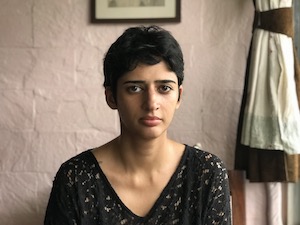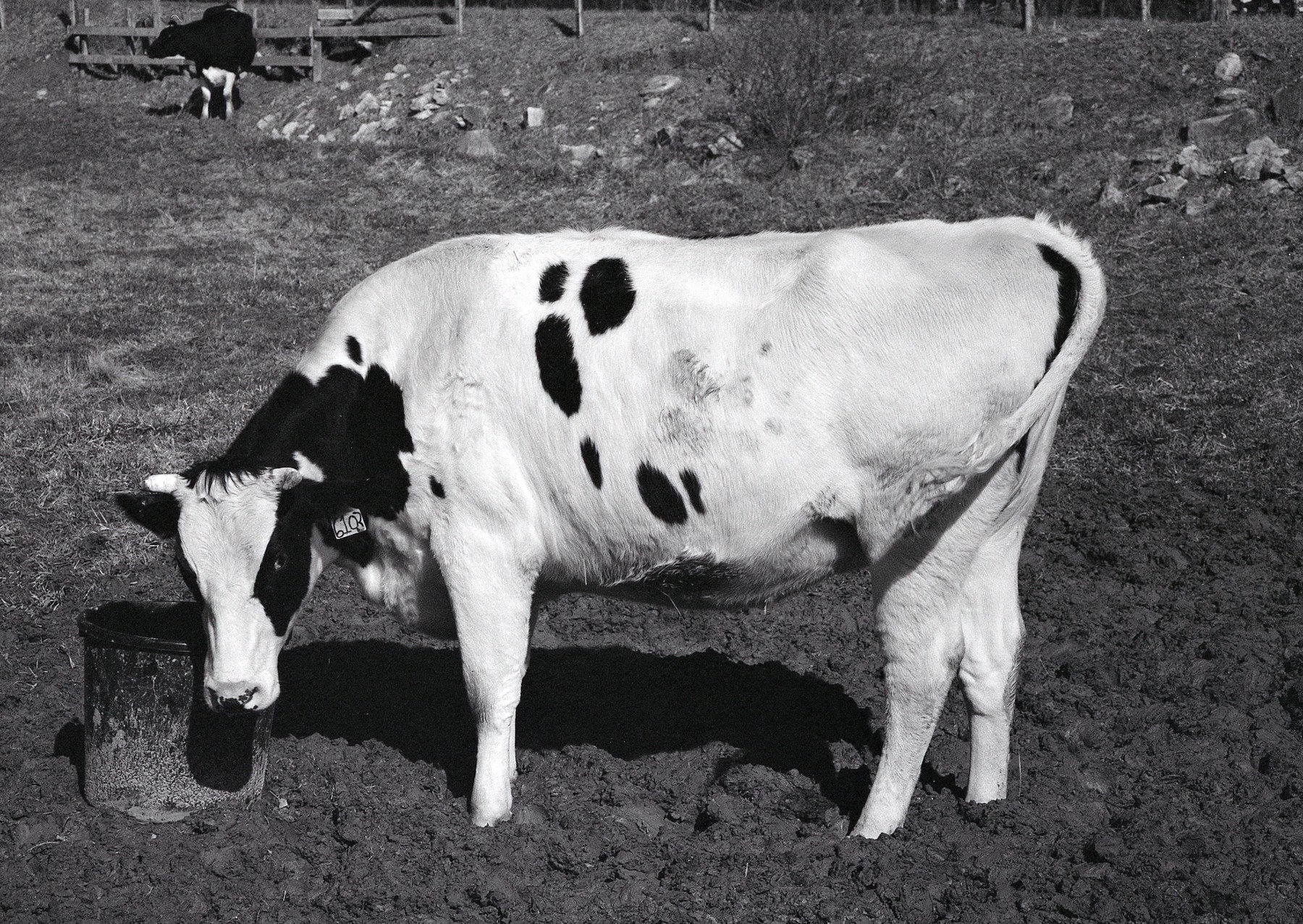I had once written a poem for a cow. Mogu was owned by Kunjumol, an ever-smiling entity who roamed free in her flower-printed cotton maxi, passing in and out of homes for odd jobs—cleaning, frying large batches of banana chips, and selling bundles of greens outside the temple that people would feed Mogu to pacify their planets. Kunjumol lived on the other side of the village, and every day at dawn I could hear Mogu’s bell as they descended the hill. Kunjumol struggled to feed and clothe herself but was a firm believer in trooping through hard times. An expert forager, she could tell the difference between a poisonous mushroom and a good one, but she always gave the credit to Mogu.
“Mogu is the bright one. She is meditating when she chews the cud,” she’d say about the oblivious cow.
I remember Mogu to be an elegant cow with bright eyes, a strong build, and a shiny black-and-white coat. The story went that Kunjumol had found her as a calf, bellowing in the hills, hungry and alone, and taken her home. Ever since, Mogu had followed Kunjumol everywhere, grazing along the way to the jobs and waiting for their meals together. Kunjumol cared for Mogu like a child. I assumed it made sense since she had no children of her own.
I’d only moved to the village recently. I was desperate. My sister and I had run out of funds, burned through our inheritance. It had only taken us five years to finish it—the money, the shares, the jewelry. Everything was gone except for a piece of land and a dusty house, which was once, briefly, home. I proposed the idea of finding a way to make a living off the land. Maybe a faint sense of responsibility had awoken within me, or maybe holding a job had become too difficult. Perhaps I did not belong in the bright lights. Of course, one needs a much more appropriate excuse than self-doubt to run away from the city, so I announced that I was going to write a novel on the ongoing drought, with the village as the central character. And there was no dearth of material.
Quickly, I became accustomed to watching the women tussling at the water pump for exactly four minutes before the supply was gone, the tap dried. I watched the village empty till the only ones left were the old men, women, their daughters-in-law, and me. My sister occasionally sent me money from the city.
It was essential that I take a bath every day to be in the right mental and physical state to expose the ugly truth behind the man-made drought, but I kept this to myself.
And then the dairy depression hit.
It was a mysterious disease, UBI. The death toll had been steady for years, mostly children, and the government had blamed the reliable culprits: diarrhea, encephalitis, malaria—diseases that occurred in rural areas. But it all changed once the virus had successfully traveled business class and an American died after consuming a batch of kadhai-paneer. We watched a hysterical media cycle—high-impact teams were organized, and the true offender was discovered: a mutated strain in cow milk. Experts theorized it was the years of eating plastic, but nothing was ever confirmed. And just like that, dairy became dangerous.
A tsunami of job losses, from the dairy farmer to the neighborhood halwai, struck the country. The cow vigilantes usually found terrorizing the route taken by the tanners, began running away at their sight. The impact on breakfast, lunch, and dinner menus was catastrophic. Sweet meats, curd, paneer, beef, chai, butter—gone. Of course, international, certified-safe dairy milk was still available at supermarkets for those who could afford it. The shared dehydration had created a temporary limbo in the general religious discrimination and xenophobia in our village.
Fearing the loss of foreign investment, the army was called to nip the problem. They appeared in our village, in every village, setting up stations and rounding up the cows. They would be killed, and the disease with them.
“What has Mogu done? No. They can’t have her,” Kunjumol told me with an impenetrable expression. She was pouring water from her glass for a thinner Mogu, who graciously lapped it up. “They will have to kill me before they get to Mogu.”
But after decades of unsuccessful attempts at being taken seriously, the environmentalists saw an opportunity and took it.
“Don’t let Mother Cow’s sacrifice go to waste. Go Vegan!” proclaimed the posters everywhere—stylized stencil portraits of a cow sacrificing her life for the earth and humanity, the word “hope” above her in red, beige, and blue. Twenty people, four hundred unofficially, died protesting the first cull.
The government could neither cull the cows nor let them free.
The mission had changed. Cows were declared an endangered species. All of them were to be placed in sanctuaries, where they would be safe from the drought and saved from death. A new nationwide tax would maintain the sanctuaries. Of course, it was nonoptional. And there was a story to make it all palatable.
“It is for the nation,” I heard the temple priest say to Kunjumol, calming her spirit as he collected the water offerings. “Gau Mata will save the planet.” Since the drought, villagers had taken to donating water to the temple. Every month, they would fill a tub, in which the priest would place a Shivling, to invoke the god of rain.
“Don’t worry. Mogu will be all right,” he repeated to the nervous Kunjumol.
“The nation needs big strong cows for its army,” Kunjumol said to me with glistening eyes when she visited. I was sitting next to the empty well in the backyard, a paper folded neatly inside a plastic bag, waiting for her. “Mogu will bring back rains. Bring honor to our village.”
She stroked Mogu’s skinny back, and the cow mooed, her neck now accessorized with a holy cross, holy leaves, and an amulet tied with a thick string by the villagers as blessings. Since the UBI outbreak, they had been loading up on prayers, havans, fasting, tokens, amulets, and masses and spent much of their time involved in some religious activity. I had decided to write a goodbye poem to pin on Mogu’s necklace. I was surprised by an unexpected feeling. Kunjumol was finally letting go of the cow.
I reminded myself that at least now she would have more food and water for herself. I would have to leave soon, too. The novel had been on pause, and my daily bath routine had been reduced by half. My sister has lost her job at the ice cream factory. We had been forced to sell our land to Benchi, the goat farmer, now the new prime supplier of milk in the area, and I was considering a job in one of the newly constructed cow sanctuaries. The work seemed easy enough, it was simply to feed the cattle and provided boarding. I could write my novel there.
As I was tying the paper to Mogu’s thread, a gust of dusty wind blew into my eyes and the thread into the well. Immediately I went after it climbing down the parched well. I remembered the winters when we would visit the village, lush with rice and bananas, faces that recognized me but that I did not know nor think about. I used to stare at them from a certain comfortable distance, with the feeling I now recognize to be safety. But now, this place was home. Perhaps that was the real reason I had returned.
I came up, sweaty and heaving and saw tears streaming down Kunjumol’s cheeks. “Everyone thinks I take care of Mogu because I have no children. But it is Mogu who takes care of me,” Kunjumol said and placed the poem around the cow’s neck. “I don’t know what I will do without her.”
“Mogu will be all right,” I asserted.
“Yes,” she repeated. “Mogu will be all right.”
The next day, she delivered Mogu to the army station, a mega congregation of cows. Thousands of them were spread out, decorated with special accessories, a strong patriotic fervor to some of them and waiting to be loaded onto the train and taken away to the sanctuaries. Soldiers patrolled the area, tagging cattle and handing out registration numbers to the owners.
I heard that Kunjumol stayed on talking to Mogu long after the cow had been enlisted. Some of the soldiers laughed and cracked jokes.
One of them came to her. “Amma, your cow is going to be serving the nation now. We are going to give her water and feed every day.”
“When is the train coming to take them?”
“In three days.”
Kunjumol left, but she was back the next day. The soldiers continued to smile, enlisting more cattle, while she patiently waited under the tinted shade of a paan-beedi shop till finally it was time. She stayed on till the last cattle was loaded on the train, and as the wheels turned, the soldiers grew silent. A few weeks later, before I left the village for the job, Kunjumol visited me to wish me luck and make a request: to send her a picture of Mogu if I saw her.
“She has a small gash on her forehead on the right from a fight with a crow,” she reminded me.
I am not sure I have seen Mogu. It has been five years since the last monsoon, and all I do is give water to cows twice a day. There are rumors of a water pipeline, but I don’t know what to believe. There’s speculation about a UBI cure. Now I wash only once a week. Sometimes I watch the cattle in the underground bunkers, standing patiently, ribs showing. Sometimes I can’t look at them. I hope I have not seen Mogu. That it rains soon. That I love someone as much as Kunjumol loves her.

Sonal Sher lives and works in Mumbai where she writes fiction about alternate realities when she is not deconstructing old Hindi songs. Her fiction and non-fiction have been published in Chicago Review, Scrivener Creative Review, the Conium Review, Pratham Books’ StoryWeaver, the Hindu, and Emrys Journal.

